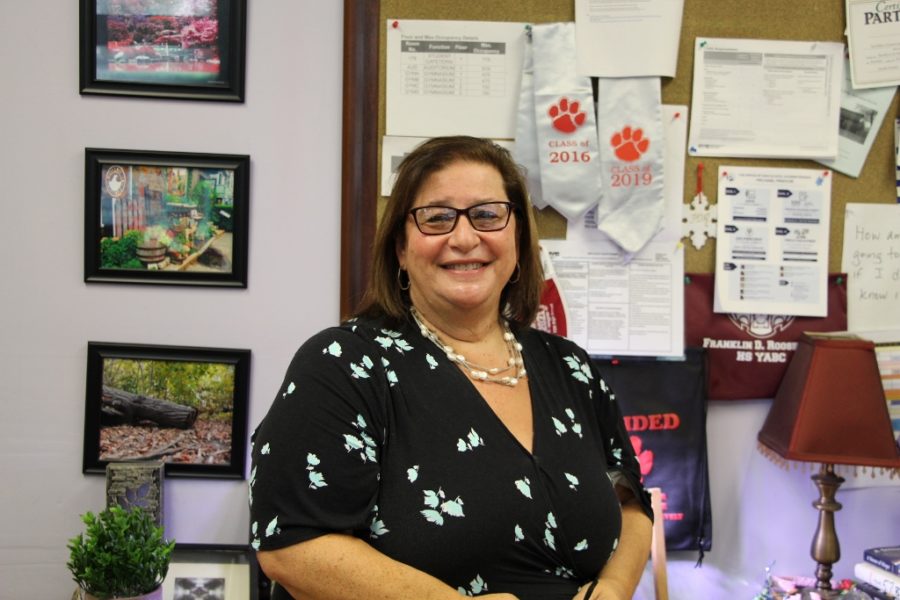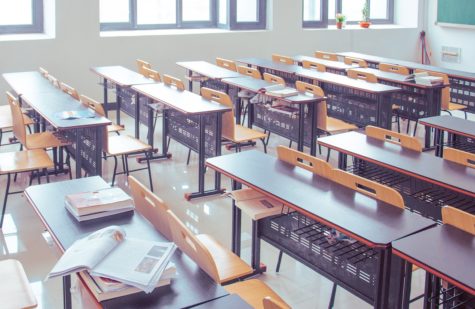Welcome Back! An Interview With Ms. Katz
Welcome back returning Cougars, and welcome to the new wave of freshmen! We at The New Dealer hope everyone had an amazing summer break and that all are getting accustomed to being back. It’s the second year we’ve been back to in-person learning here at FDR; with it comes new challenges, goals, and hopefully amazing times for all Cougars! As per tradition, The New Dealer, kicks off the school year with the opportunity to interview our one and only principal, Ms. Katz. We were able to discuss the new school year including the hopes, wants, and issues surrounding it!
The New Dealer: This is the first year back where we’re supposed to feel normal in a sense. Last year, while in person, still had many harsher regulations in place regarding Covid and all its limitations. Of course, the year before that was online. Covid is still an existing problem but with fewer regulations, this is the first time we’re “normal.” In your opinion how is FDR handling this “supposed” year of being back to “normal”?
Ms. Katz: I think it’s good, it feels like a more normal year than we’ve had in the past few. The health screening is gone, and FDR can choose whether to wear masks or not. There was a vaccine requirement lifted for clubs and the PSAL, so more students can participate in these things. I hope everyone is healthier this year.
The New Dealer: Of course, you never know when things might happen or pop up so you don’t want to jinx it in a way.
Ms. Katz: It feels better. Last year was wonderful, being back together, but it was difficult for many people. Students, parents, and staff were all concerned. This year it feels like we’re back in action, but we’re also aware that we are going to have times when we have to react in some way shape or form. Either with Covid test kits or something else.
The New Dealer: Yes, I’m sure most people are happy everything seems to be calmer, but we still have to be ready for these things as a school and react when necessary. While everything is much better for a lot of people, this still is a less-than-ideal situation.
Ms. Katz: Yes, definitely.
The New Dealer: An issue I know that most students and teachers alike are concerned about is the execution of our former scheduling & grading system, Pupilpath /Skedula. In terms of grading & attendance, everything has been hectic with students concerned with how to keep track of grades and the scheduling issues that have been arising. What is FDR doing to resolve these issues with the new grading/attendance system?
Ms. Katz: Okay, first of all, I have to give a huge shout-out to the teachers for the attendance. We’ve gone full-on with the new app. It’s called GAMA; grades, attendance, messaging, and application. So far, GAMA attendance has worked out pretty well. It looks like it’s stabilizing. Each day we’re seeing improvements, and we expect that the whole GAMA system is going to have a huge upgrade by November 15. For grades, some teachers may be using the GAMA app. We haven’t required it, because we want to make sure that it’s working before we trust our grades to it completely. Most teachers are capturing grades in Google Classroom, and that’s good because the students have access to it. It’s not as good as the previous system, because the parents don’t have access. But, I’m told by November 15, students and parents will have much better access to the GAMA application.
The New Dealer: How different would you say GAMA is from Pupilpath, in terms of students easily being able to see things like summative assessments, formative assessments, and all the finer details about their grades? Pupil Pass was organized in a way where students could see their grades, which assignments went to what, and how everything was organized. It was a great tool to see where improvement was necessary for a certain class.
Ms. Katz: I haven’t seen the final organization, but I know that when the teachers import assignments- they can either put assignments directly in GAMA or they can import them from Google Classroom. When they import it from Google Classroom, they’ll say it’s for this marking period, for this type of grade, and then it will be organized. It should be okay, but I haven’t seen the final version yet.
The New Dealer: All right, thank you, looking forward to when we can access that app. My next question for you is, what is FDR’s main focus for this year? What are your main goals to accomplish this year?
Ms. Katz: For this year, we looked at our performance from last year. Our graduation rate was 74%, which we can always improve. We also have looked at specific groups to support. I think the main goal is to recognize that even though we were back for a year, we all came back with such different needs and some gaps that we have to continue to address. We need to really learn how to address the individual needs, and groups of needs, for students. For example, Map Growth, it was the first year we used it. That may be used more intensely in some classes. It may be that Math teachers are using Delta Math, and they’re tracking a student’s performance over a few assessments. It may be exit tickets are used separately. The point is that the NAEP test showed that kids, all across the country, have lost years and years of progress in ELA and Math. We have to continue to build it up.
The New Dealer: Yes, definitely. With the testing, it’s all been skewed because you have online learning and these incoming kids from junior high school, who missed a year of in-person high school, are now in their junior year with fewer years of actual school. In person, you’re getting used to everything and learning how high school learning is supposed to be. So, you have those gaps and test scores and all those disparities.
Ms. Katz: And we have a large L population (multilingual learners), and they haven’t had the chance to produce speech as much, and that’s going to delay their improvement. Speaking is so important when you learn a language. We also know that for some students, it was the first time they sat down in two or three years for more than 45 minutes to take a test. Let’s say you’re a 10th grader, you’re sitting down for the Global Regents. Hello! It’s 3 hours! You may not have done that before.
The New Dealer: Hopefully this year we build on those skills for all students. Now, this next question is something I as well as many other students also wanted to know about. With the creation of the new AP of Climate and Culture, as opposed to AP of Security, in what ways will the security of the building be managed differently? I think the question that I really want to ask is also why the name change?
Ms. Katz: Security is important. We cannot run the school unless we’re a safe building. There’s an educational psychologist called Maslow, and if you’ve seen any emails that I’ve sent, it’s Maslow before Bloom. You need the basic needs of someone met before they can learn. If you don’t feel safe, you can’t learn. So safety is there, and I’m very grateful for all the work that Mr. Manning did. But, there’s also the component of why a student would act out, why a student may behave in certain ways. The whole idea of Climate and Culture is so that it’s not seen as being just punitive, but trying to work to improve and prevent issues in the future. This Friday afternoon, Mr. Repolie will probably make her, “Thank you. It’s been a great week guys,” announcement, and it’s really recognizing the fact that we have great students. People don’t understand how wonderful our students are. Our students care about each other and care about the community. Climate and Culture is saying, let’s talk about taking care of our community and preventing the silly things that we can prevent. In the event that there is an unsafe condition, everything falls into place. But, let’s try and build on the great community we have.
The New Dealer: 99% of the students here are good students, great students even. The only issues that arise are between the few kids that might cause or have conflicts. So, what I’m understanding with this name change, what we’re trying to focus on is more preventive than reactive- than what might have been before. For example, making sure that unsafe conditions or conflicts don’t happen, its more than reacting to when they do happen.
Ms. Katz: Everyone has an opportunity to do something they shouldn’t. When they do it, how do you welcome them back into the community? When you do something and your parents are upset, they don’t say you’re gone. They bring you back, and you figure it out. We know that when a student does something, and they come back to us, we want them to rejoin us again. A truly unsafe situation is different, but we are a community, and that helps us take care of each other.
The New Dealer: Yes, that’s what I really like about the peer mediation office that we have in our school. Instead of just outright punishing students all the time for any mistakes that might arise, or conflicts they might have with friends or any other people, they get to sit down and have that opportunity to talk about and squash the issue. Before anything drastic happens.
Ms. Katz: We are a very very lucky school with our amazing students and every one of them should have that opportunity to reenter the school environment after a conflict.
The New Dealer: Definitely. Now it is a continuation of a topic I was really interested in nearing the end of last year. What are FDR’s plans this year, if any, for making the school feel more open for all students? Last year we had the Culture Fest, which was arguably one of the most open days of the school year. Students got to go around to different parts of the building and experience all the different cultures at FDR. That day the school felt like one open big community. How are you planning to carry on that momentum from last year?
Ms. Katz: We are going to continue some things, like we’re going to have a freshman mixer on October 6th- which will be more open and have various other activities like that. When we have something so open, we also have to balance it with safety. I need to know where kids are. I need to know where people are stationed, and make sure no one’s getting on campus. So, we are going to continue, and it may be we’re going to look at different models. We’ll have another Culture Fest. It may be a different model, where part of it would be on campus, in the cafeteria, in the gyms and so forth- with more openness, but a little bit more structure. The students during Culture Fest were not staying in the hallways, and no one was in the stairwells. People were doing things.
The New Dealer: Yes, we need to give the students the opportunity to show and prove themselves, to do all these different activities. All we need to do is give the students the platforms that they need, so they can live their best lives at FDR. All the while, like you said, keeping them safe, which is a priority we have to balance with openness.
Again, thank you to Ms. Katz for joining us for this interview! We here at The New Dealer hope everyone has an amazing and safe school year!











